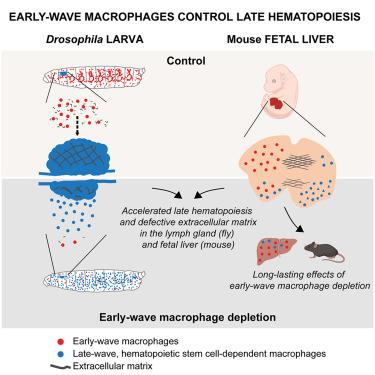Developmental Cell ( IF 11.8 ) Pub Date : 2024-04-02 , DOI: 10.1016/j.devcel.2024.03.013 Sara Monticelli , Alina Sommer , Zeinab AlHajj Hassan , Clarisabel Garcia Rodriguez , Kémy Adé , Pierre Cattenoz , Claude Delaporte , Elisa Gomez Perdiguero , Angela Giangrande

|
Macrophages constitute the first defense line against the non-self, but their ability to remodel their environment in organ development/homeostasis is starting to be appreciated. Early-wave macrophages (EMs), produced from hematopoietic stem cell (HSC)-independent progenitors, seed the mammalian fetal liver niche wherein HSCs expand and differentiate. The involvement of niche defects in myeloid malignancies led us to identify the cues controlling HSCs. In Drosophila, HSC-independent EMs also colonize the larva when late hematopoiesis occurs. The evolutionarily conserved immune system allowed us to investigate whether/how EMs modulate late hematopoiesis in two models. We show that loss of EMs in Drosophila and mice accelerates late hematopoiesis, which does not correlate with inflammation and does not rely on macrophage phagocytic ability. Rather, EM-derived extracellular matrix components underlie late hematopoiesis acceleration. This demonstrates a developmental role for EMs.
中文翻译:

早期波巨噬细胞控制晚期造血
巨噬细胞构成了对抗非自我的第一道防线,但它们在器官发育/稳态中重塑环境的能力开始受到重视。早期波巨噬细胞 (EM) 由造血干细胞 (HSC) 独立祖细胞产生,在哺乳动物胎儿肝脏生态位中播种,HSC 在其中进行扩增和分化。骨髓恶性肿瘤中生态位缺陷的参与使我们确定了控制 HSC 的线索。在果蝇中,当晚期造血发生时,不依赖 HSC 的 EM 也会在幼虫中定殖。进化上保守的免疫系统使我们能够在两个模型中研究 EM 是否/如何调节晚期造血。我们发现,果蝇和小鼠中 EM 的丧失会加速晚期造血,这与炎症无关,也不依赖于巨噬细胞的吞噬能力。相反,EM 衍生的细胞外基质成分是晚期造血加速的基础。这表明了新兴市场的发展作用。



























 京公网安备 11010802027423号
京公网安备 11010802027423号